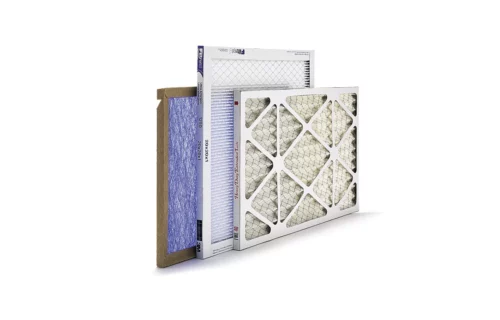
Overview
Your home’s heating and cooling system has many different parts and one of the most important pieces is the filter. All forced air systems should have a way to filter the air that is circulating throughout the space that you are heating or cooling. An effective filter with proper changes will not only extend the lifespan of your equipment but it will also increase its performance.
What is a filter?
An air filter is a piece of material that sits in the airstream that is designed to collect particles of debris before the air enters your equipment. Typically you will find the filter right at the side of the furnace where the return air enters. Some applications have air filters behind the return grates distributed throughout the home. Contrary to popular belief, the primary purpose of the filter is to protect the equipment from becoming dirty or clogged rather than cleaning the air for you to breathe. Other accessories can be added to your HVAC system that are specifically designed to increase the indoor air quality for the occupants of the space.
When should they be changed
Proper maintenance of your equipment is very important and changing your filter is the most basic item of maintenance that should be done on a regular basis. Most standard 1 inch thick filters are designed to be replaced every 1 – 3 months. Even if your filter manufacturer says that it will last 3 months, checking the filter every month is always a good idea to avoid unforeseen issues. As filters collect dirt and debris they become more and more restrictive which can overwork your furnace or air handler due to the reduced airflow.
What filters to buy
Filters come in many shapes and sizes. Additionally, the materials used to construct the filters can also differ from brand to brand. Going to the hardware store and seeing the isle full of filters can sometimes be overwhelming to a homeowner. When selecting the filter to buy there are 3 things you must know:
- Size: The size of your filter must be exact inorder to fit in your filter rack without allowing air to bypass around it. Dimensions are found printed directly on the filter itself. Typical sizes are something like 16x25x1 or 20x25x1. There are many sizes out there so make sure you pick the one that matches your filter rack.
- MERV Rating: MERV or the Minimum Efficiency Reporting Values is used to identify how efficient a filter is at catching particles that are in the air. MERV ratings are from 1 – 20 with 20 collecting the most particles and 1 collecting the least but dont thinking that more means better. Too high of a MERV and your furnace or air handler won’t be able to move enough air. Too low and you won’t be doing an adequate job of keeping that equipment from being exposed to dirt and debris. For 1 inch filters we recommend a MERV rating in the range of 5 – 8.
- Filter Material: Size and MERV rating are the two most important things to consider but the material may be of concern to some. Most 1 inch filters are made of either fiberglass or pleated fabric. Fiberglass is generally the cheaper of the two and comes in MERV ratings up to 5. They do a good job protecting the equipment but very little to improve the air quality of the home. Pleated fabric filters are made from polyester or cotton and typically can be found with MERV ratings up to 13. Pleated fabric will generally do a better job protecting the equipment and do slightly more to improve the indoor air quality than fiberglass.
What filters to avoid
In our experience with 1 inch thick filters it is best to avoid anything with a MERV rating too high or too low. Many filter manufacturers offer filters that are marketed as being superior at filtering allergens such as pet dander and other particulates out of the air and have a MERV rating usually around 13. These are filters that we would strongly recommend not using on your equipment. A 1 inch filter with a MERV 13 rating is far too restrictive and will cause unnecessary wear on your equipment. As the filter collects dirt, it will continue to get more and more restrictive as well. The potential is there for your furnace to be starved of air and either cause it to overheat in the heating season or freeze up during the cooling season. Inversely, a filter with a MERV rating of 2 doesn;t do a good enough job protecting your equipment from the dust and debris in the air. The filter will allow that dust through and it will collect on your heat exchanger and/or air conditioning coil which will greatly affect the performance of your system.
Increase filter capacity
While 1 inch filters are the base filter that any forced air system should have, there are ways to get filters that do a better job and last longer. 4 and 5 inch filters can be added to most systems by changing the return duct work near the equipment to be able to accept the thicker filters. With a thicker filter, it is safer for the equipment to be able to run a higher MERV rating while still allowing for ample air flow. The frequency of change also decreases with many being able to last up to 1 year before replacement is required.
